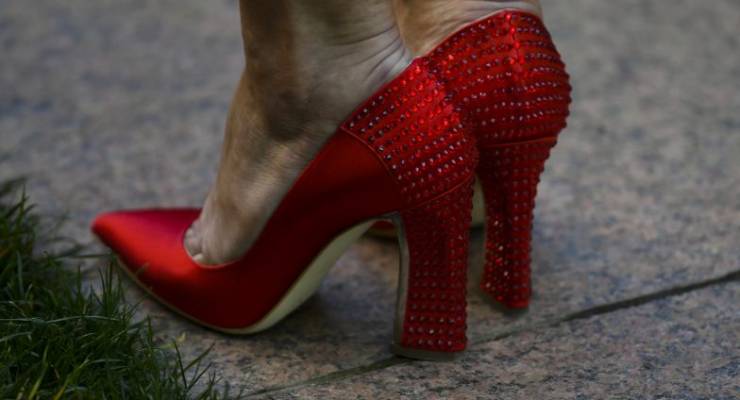
Well aside from the Liberal Party’s leadership problem and its energy policy problem and its polling problem, there’s also the recently contested issue of a “woman problem” or, as the The Conversation neatly puts it, a “man problem”.
Liberal MP for Chisholm Julia Banks’ resignation citing bullying and intimidation this week has set off a domino effect: mostly of people denying the problem or telling her to suck it up. Her statement echoed the likes of Linda Reynolds who said she did not recognise her party, its values and “the bullying and intimidation that has gone on” in the leadership spill push by Peter Dutton and his conservative camp, not to mention commentary suggesting Julie Bishop was hard done by.
[Reaction to Banks shows us that party powerbrokers dislike democratic participation]
Sky News’ Laura Jayes also tweeted about the alleged bullying, noting it was widely known that “some Liberal MPs were mercilessly bulled into showing their ballot papers to colleagues” with future pre-selection on the line if they refused.
But the question of intimidation of women in the Liberal Party is a difficult topic to draw those precise women on. Speak out, and you’re instantly fielding attacks. So we asked two experienced female politicians with difference perspectives: how big is the general problem of bullying in politics and what can be done?
Cathy McGowan: current independent member for Indi
Julia [Banks] is a woman of extraordinary courage, [this is a] lesson for all our workplaces. If you’re not safe in your workplace, have the discussion with the people you’re responsible to and then leave. It would had have been terrible if she had been pressured into staying. That’s a really important message — if your workplace is not working out, you should leave.
Everyone is jumping up and down and saying it’s bad that she’s going, but I say good on her.
I don’t think this should stop women entering politics though. I think you should know your “why” or your motivation. To many women I say, come and work in my office and see if that’s what you really want. My advice for women is stand as an independent and win a country seat. I don’t get bullied.
I think most of us can cope with people behaving badly, you only need to be part of any community group or netball group to know what that looks like, you get through life and learn to work around it. Or you know your boundaries and figure out when to leave.
Meredith Burgmann: former president of the NSW Legislative Council
I think right now it’s a bunch of blokes who want to continue behaving badly, and women have to too because that’s their party culture. Women are such a tiny percentage — just over 20%. There aren’t enough women there to threaten anyone or to make it clear you can’t behave in a certain way. The Labor Party are now 48% and that is critical mass, so men recognise they can’t behave that way without consequences.
Bullying can only happen from your own. The other side is pretty irrelevant, that’s ritual, and it’s not terribly distressing but it’s only when your own side piles on that you can feel bullied. There were occasions when I felt bullied by my leadership which was a male leadership. I was in parliament 30 years ago and the leadership was very male.
Another more controversial view I believe is that the formalised factions in the Labor Party make for a more civilised discourse because the rules are known. There are formal factions, what is expected of you, what you can or cannot do. No one in the right would have dreamt of approaching me if there was a vote on. It wouldn’t have happened. When I talk to women’s groups, I tell them to fight for formal rules, fight for there to be written rules. If there are only unwritten rules, only the men know them.
Got something to add? Please email us at boss@crikey.com.au.








I just don’t understand why the departing MP and others who’ve been subjected to bullying wont name names…Running a protection racket for the perpetrators is really just enabling them.
Agreed, it’s a no brainer. Name the clods at let them defend their actions.
Correct, the voting public has a right to know if their elected representative is misbehaving in a way that would not be tolerated in any other workplace or public organisation.
On the flip side the Emma Husar staff bullying issue should also have been dealt with far sooner, her now claims to be a victim of bullying is something that could have been avoided if the staff issues were addressed earlier.
If you’ve aired your dirty laundry in public, you need to also make public the effort to wash off the stains.
Chris Uhlmann said he knows the names, put the allegations to the people named, they denied it (of course) and so he hasn’t published.
Compare and contrast the allegations mentioning Jason Clare and Emma Husar.
So Uhlman has taken it upon himself to run his own protection racket for the Coalition…just as Murphy and others did early in the Joyce scandal.
Burgmann’s sort of right; but it’d be good to know how much faction bad behaviour was involved in the demise of Emma Husar. As other posters have pointed out more transparency is needed. Voters should know what kind of people represent them.
My thoughts
To the people who say Banks should stay because we need more like her, I say we need fewer miners, bankers and lawyers, I have no problem with her leaving. Julia Gillard suffered more than anyone and I didn’t read Liberal women defending her, they stuck the stilettos the same as the men.
I am not a defender of bullying, and I am aware that bullying is rampant, but it is not just men bullying women, it is men bullying men and women bullying women and men. It is not restricted to the Libs, Nats or politics in general. Bullying is rampant in Australia, in business, in the defense forces, in hospitals, in the Public service and in retail, it is everywhere, at all levels and it should stop.
However, the tears for Banks are crocodile tears, what greater corporate bully is there than News? We don’t see bullying being attacked. It is being used with Banks, as with the Visa scandals, to tarnish Dutton and his supporters. Again, I don’t mind them being trashed, I’m all in favor, and I would include Morrison as well, but trash them because of what they are doing to our country not to one of their own
How amazing that a woman is bullied out of a seat named for that great hero ,Caroline Chism you-from 200years ago. You couldn’t make this up
Depends on how desperate they are for money and power.